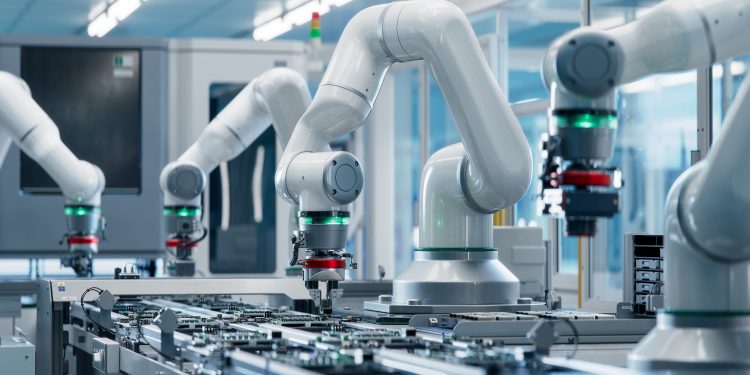Riyadh’s Industrial Ambitions: A Leap into Advanced Manufacturing
As Saudi Arabia embarks on a transformative journey to enhance its industrial sector, the nation is set to integrate innovative manufacturing techniques, positioning it as a central pillar of economic growth. Leading industry expert Karim Shariff, who heads the advanced manufacturing services practice in the Middle East for Bain & Co., highlighted the Kingdom’s goals to boost productivity, resilience, and sustainability within the industry.
The country has a strategic vision to expand its number of factories to 36,000 by 2035, with 4,000 anticipated to be fully automated, fostering an environment ripe for cutting-edge production. This leap forward involves the integration of artificial intelligence, 3D printing, and robotics, establishing Saudi industries at the forefront of the manufacturing revolution.
Shariff points out that Saudi Arabia is actively implementing programs, overseen by the Ministry of Industry and Mineral Resources and the National Industrial Development and Logistics Program, to promote adherence to the highest standards of advanced and environmentally friendly manufacturing. These initiatives are designed to enhance the private sector’s capability to build competitive facilities both regionally and globally.
For the Kingdom to achieve excellence in manufacturing, Shariff suggests a comprehensive approach that embraces not only automation and autonomous facilities but also a systemic integration of digitization, circular economy principles, and skilled workforce development.
Since the launch of Vision 2030 in 2016, Saudi Arabia’s industrial sector has seen a steady rise, with manufacturing investments totaling $132 billion. A key aspect of this resurgence is the embrace of Industry 4.0, which involves leveraging the Internet of Things, artificial intelligence, and robotics to create interconnected and efficient systems. This shift aims to move the nation’s economy away from its traditional reliance on oil.
In December 2022, manufacturing activity in Saudi Arabia experienced an 18.5 percent increase, indicating a strong adoption of these transformative technologies. Shariff believes that to maintain this momentum, Saudi Arabia must fundamentally alter its manufacturing landscape, with the adoption of Industry 4.0 principles being essential to nurturing a robust manufacturing ecosystem. He emphasizes the need for targeted government policies to support workforce talent development and energy efficiency, ensuring a balanced transition.
The importance of establishing new factories with appropriate standards from the outset, coupled with curricula and training from educational institutions that bridge the talent gap, was also underscored by Shariff. To bolster the sector, Saudi Arabia is engaging in international collaborations, notably with Türkiye, reflecting a progressive strategy to diversify industrial expertise.
Bandar Alkhorayef, the Minister of Industry and Mineral Resources, has highlighted the potential for international partnerships in strategic sectors, underlining the significance of technological advancements. The overarching goal of the National Industry Strategy, a cornerstone of Vision 2030, is to position the industrial sector as a global competitor and a sustainable part of the economy.
In pursuit of innovation, domestic optimization, and global partnerships, Saudi Arabia is working to boost the industrial sector’s contribution to the gross domestic product by SR900 billion ($230 billion) by 2030. The strategy prioritizes local content development, aiming to increase the proportion of locally manufactured products and services to 60 percent by 2025.
The “Made in Saudi” program, launched by the Saudi Export Development Authority in 2020, aims to promote local consumption and has led to a surge in domestic manufacturing with over 2,000 new licenses issued and 193,000 new jobs created in the industry. The Saudi mining industry has also seen significant growth, with over 1,300 new licenses and $32.4 billion in investments, positioning mining as a key pillar of national industry.
Future Outlook
Saudi Arabia’s determination to attract foreign investment through incentives and local production requirements highlights its commitment to economic resilience. Initiatives such as the Industrial Development Fund and the development of specialized economic zones are set to accelerate industrial growth. The synergy between public and private sectors, seen in initiatives like Operation 300bn in the UAE, ensures a unified approach toward digital transformation, contributing significantly to the manufacturing sector’s expansion.
Looking ahead, Saudi Arabia’s industrial sector is poised for substantial growth, driven by strategic planning, international collaborations, and unwavering dedication to technological innovation.


